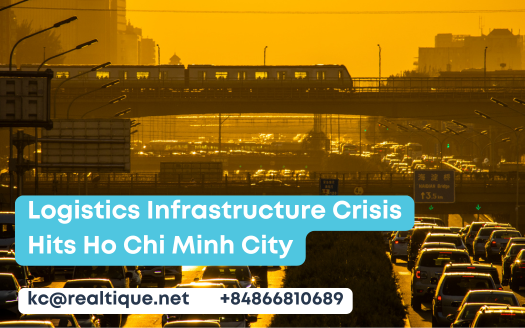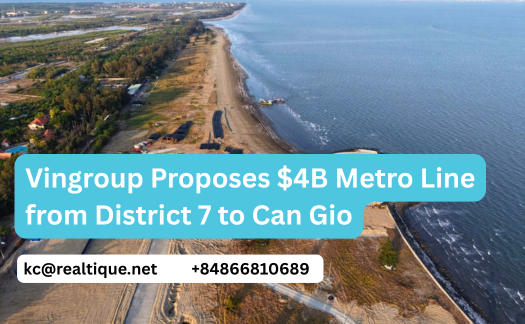Logistics Infrastructure Crisis Hits Ho Chi Minh City
Ho Chi Minh City is currently facing a significant logistics infrastructure crisis, characterized by persistent congestion at its ports and airports, alongside a shortage of large-scale logistics centers. These challenges not only hinder operational efficiency but also contribute to increased logistics costs that substantially impact the city’s economic environment. As the demand for cargo handling continues to rise, the city must confront these pressing issues. The implications of this crisis extend beyond immediate logistical obstacles, raising questions about the long-term sustainability and competitiveness of Ho Chi Minh City in the global market. What strategies might be employed to maneuver this complex situation?
Table of Contents
Current State of Ho Chi Minh City's Logistics Infrastructure
The logistics infrastructure in Ho Chi Minh City is currently facing significant challenges, with foreign investment falling short of meeting the rising demand.
Despite being a crucial economic hub, the city experiences frequent congestion at its airports and ports, severely impacting operational efficiency. The lack of large-scale logistics centers further exacerbates the situation, hindering the ability to handle increased cargo volumes effectively.
Specifically, Tan Son Nhat International Airport is struggling with prolonged cargo handling times, which delays shipments and increases costs.
Additionally, the surrounding transport infrastructure does not meet current standards, necessitating urgent enhancements.
Without strategic investment and development, Ho Chi Minh City risks undermining its potential as a leading logistics center in Southeast Asia.
Challenges Faced by Ho Chi Minh City's Logistics Sector
Significant challenges plague the logistics sector in Ho Chi Minh City, hindering its growth and efficiency.
These obstacles not only impede service delivery but also inflate operational costs, making the city less competitive in the global market.
Key issues include:
- Insufficient logistics facilities, particularly in regions like Nam Binh Duong.
- Outdated warehouse lease terms that often exceed 20 years, limiting flexibility.
- High logistics costs, comprising approximately 25% of GDP and 30-35% of product prices, which surpass global averages.
- Ongoing infrastructure congestion, resulting in inefficiencies and service delays that further exacerbate operational challenges.
Addressing these issues is essential for the logistics sector to thrive and meet the increasing demands of a growing economy.
To tackle the pressing logistics challenges, Ho Chi Minh City is gearing up for a thorough enhancement of its logistics infrastructure by 2030.
Key initiatives include the expansion of expressways (including Ben Luc-Long Thanh expressway), Ring Roads (including Ring Road 3 in completion and Ring Road 4 will soon start constructing) and the development of an integrated metro system (Metro Line 1 to be operated latest November 2024 and Metro Line 2 to be completed in 2026-2030) to facilitate seamless transport connectivity.
The construction of Tan Son Nhat Airport’s Terminal 3 is expected to significantly alleviate current congestion and improve cargo handling efficiency.
In addition, plans are underway to expand major highways (like highway 1, 1K, 50, 22 and 13) and establish modern logistics hubs that can accommodate the growing demands of trade.
Strategic investments will also focus on green logistics and the adoption of electric vehicles, promoting sustainable practices within the logistics sector.
These all-encompassing plans aim to position Ho Chi Minh City as a regional logistics leader in Southeast Asia.
Government and Business Initiatives in Ho Chi Minh City
Efforts to enhance logistics infrastructure in Ho Chi Minh City are being strengthened by collaborative initiatives between the government and private sector stakeholders.
These partnerships aim to address the pressing challenges faced by the logistics sector and pave the way for sustainable development.
Key initiatives include:
Regulatory Structure Enhancement: Ongoing discussions to refine regulations governing logistics operations, ensuring efficiency and compliance.
Sustainable Transport Solutions: Plans to implement eco-friendly logistics practices, contributing to environmental sustainability.
Foreign Direct Investment Attraction: Strategies focused on inviting foreign investments to support infrastructure and logistics capabilities.
Public-Private Partnerships: Collaborative projects between government entities and businesses to develop critical logistics centers and transportation networks.
These initiatives reflect a commitment to changing Ho Chi Minh City into a competitive logistics hub.
Ho Chi Minh City’s logistics infrastructure improvements are set to yield substantial economic benefits, enhancing the region’s competitiveness within Southeast Asia.
Projections indicate that by 2045, the city will establish itself as a key logistics hub, attracting increased foreign direct investment and facilitating trade.
Enhanced infrastructure is expected to reduce logistics costs, which currently account for approximately 25% of GDP, thereby lowering product prices and increasing market accessibility.
Additionally, improved efficiency in logistics operations will stimulate growth in ancillary sectors, contributing to overall economic development.
As the city implements strategic investments in logistics connectivity, including new expressways and terminals, a more vigorous logistics ecosystem will emerge, nurturing sustainable economic growth and positioning Ho Chi Minh City as a leader in the region.
In summary, the logistics infrastructure crisis in Ho Chi Minh City presents significant challenges that impede economic growth and competitiveness. Insufficient foreign investment, congestion at key transportation hubs, and the absence of large-scale logistics centers exacerbate existing issues. Addressing these challenges through strategic government initiatives and collaborative efforts with the business sector is essential for enhancing operational efficiency and reducing logistics costs. A focused approach towards infrastructure development will be vital for securing the city’s future economic viability.







